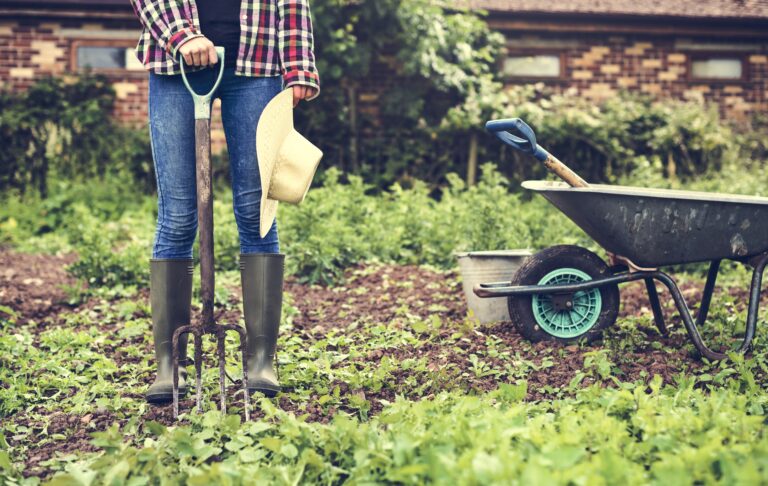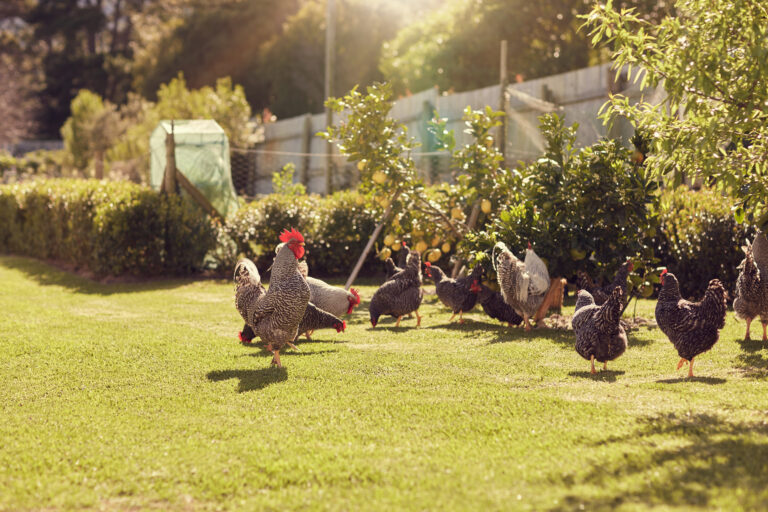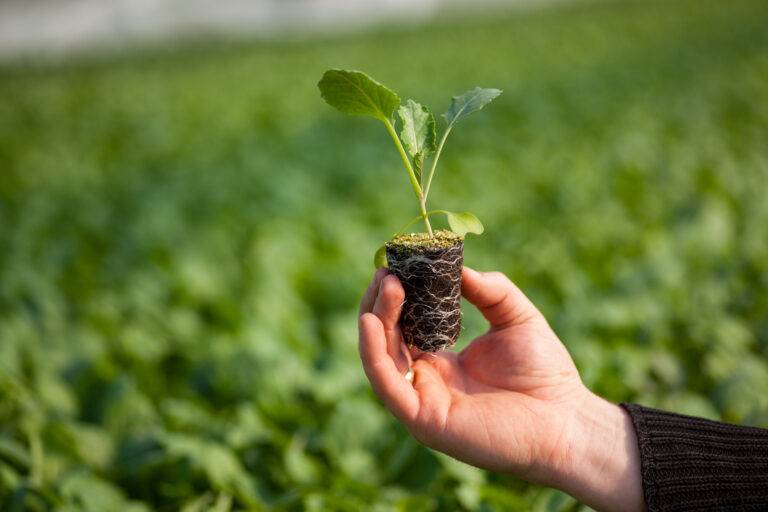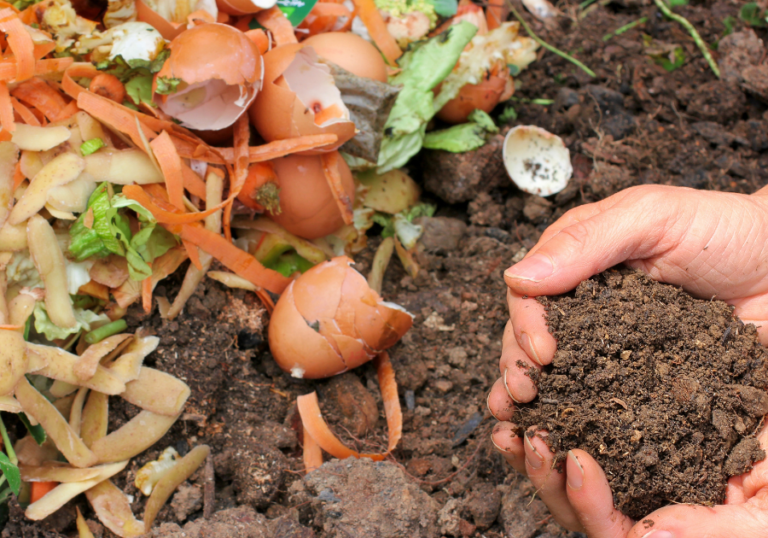Backyard Farming – Guide For Getting Started
Today we are talking about backyard farming and some simple steps to take to get started. If you are new to backyard farming, this simple guide for getting started is a great place to start.
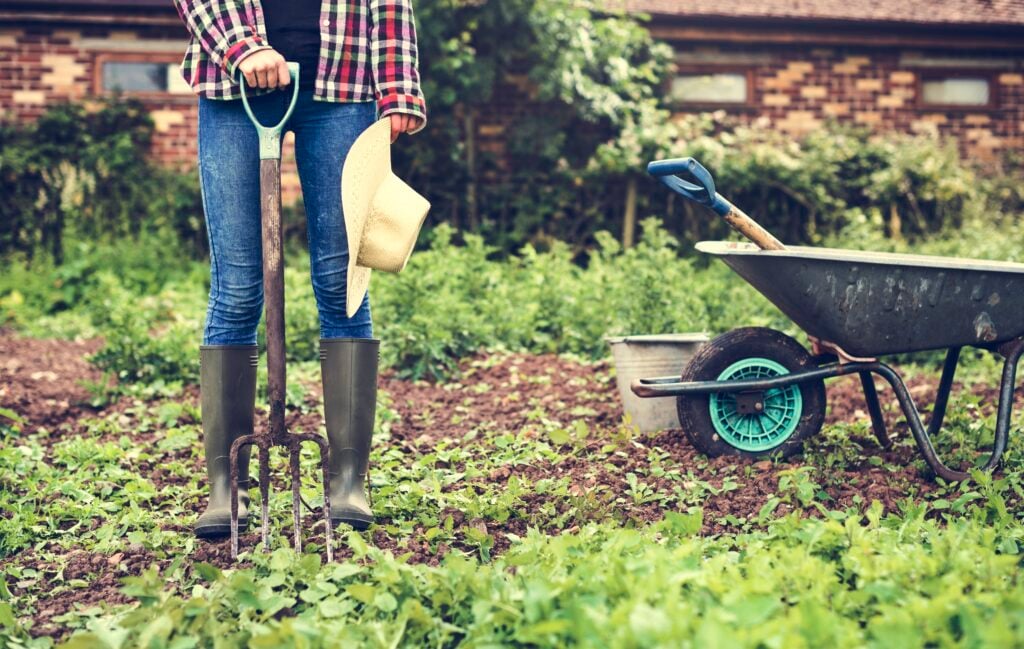
What Is Backyard Farming?
Backyard farming is the practice of using an average residential lot to grow food and sometimes even animals for consumption. Other common names for this practice are urban gardening or urban homesteading.
As food prices keep increasing and the quality of that food seems to be decreasing, more and more people are becoming interested in using their own backyards to provide delicious, organic fruits, vegetables and meats for their families.
You would be surprised how much homesteading can be done on a small residential lot. I am going to share some ideas for getting started today as well as some things you may want to work towards in the future.
This post may contain affiliate links, which means I make a small commission at no extra cost to you. As an Amazon Associate, I earn from qualifying purchases.
Benefits Of Backyard Farming
There has been a huge uptick in interest of backyard farming with all of the shutdowns and food/supply shortages(toilet paper, anyone?) we all experienced last year.
I marveled as I watched my favorite homesteading families stand unaffected by the food/supply shortages of 2020. Not much changed for them, they were still going to grow their vegetables, raise their meat chickens and milk their cow for fresh milk, cheeses and yogurt.
Watching these people carry on as if nothing was happening lit a fire under me. I wanted to pursue this lifestyle of self-sufficiency even more than I did before.
Food security is huge and I can’t say I didn’t have my moments of fear when I saw droves of people clearing the shelves at our local grocery stores in the height of the pandemic. It made me realize just how fragile our food supply chain is and how shortages like this can happen at any time.
To sum it up, benefits of backyard farming are extensive, but to name a few:
- Food Security. The ability to grow fruits, vegetables and raise animals can really give a lot of food security.
- Higher quality food. If you have ever tasted a freshly picked tomato from the garden, then you know what I am talking about. Have you tasted carrots so sweet they taste like candy? Or lettuce with so much flavor it actually tastes good? That is what growing organic food in your backyard can provide. Picking and eating produce at optimum ripeness is a game changer in the food flavor department. Try it.
- Organic food. This goes along with higher quality food, but I felt like the importance or organic produce and meats was worth its own line. If you don’t know about the awful poisons that the USDA allows farmers to dump on food crops by the gallons, then you may want to do some research. Not only are the pesticides bad for our bodies, they are terrible for the soil and environment as well. On that same vain, eating animal products from animals that are fed gmo, pesticide-ridden grains can cause inflammation and other issues in our bodies.
- Valuable life skills. Let’s not forget all the valuable skills that can be learned while backyard farming. Not just for you, but for your children as well. I think everyone should know how to sow a seed, plant a garden and harvest it’s produce. And bonus points if you learn how to raise animals for meat and humanely butcher and process them. Homegrown, pasture raised animals are invaluable. And such a fantastic life skill to learn and know and have forever.
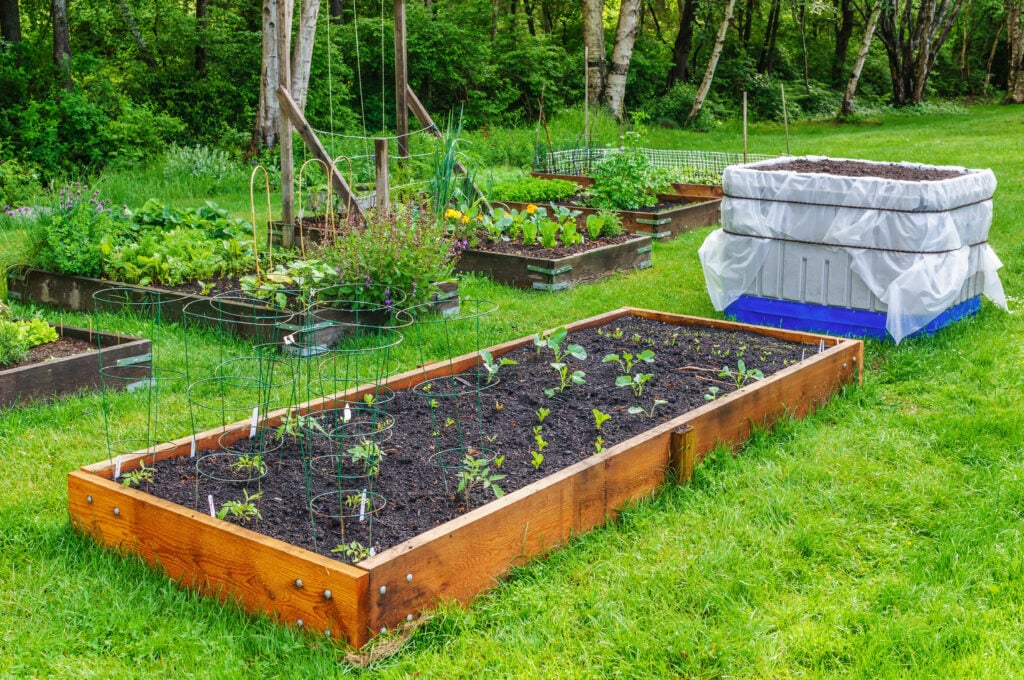
Gardening
Let’s start with the easiest form of backyard farming; gardening. Not because planting and caring for a garden is easy, but because most people have access to a lawn or small area to grow a garden. Even if you live in an apartment, you can grow some plants in pots, there are plenty of vegetables that love being grown in pots, so don’t let living in an apartment deter you from gardening.
Nothing is better than being able to pick fresh produce at optimum ripeness from your backyard, or your front yard for that matter. The flavor can’t be beat. There are many techniques for growing gardens in small spaces, such as container gardening, tower gardens and even adding edibles into your landscape or window boxes.
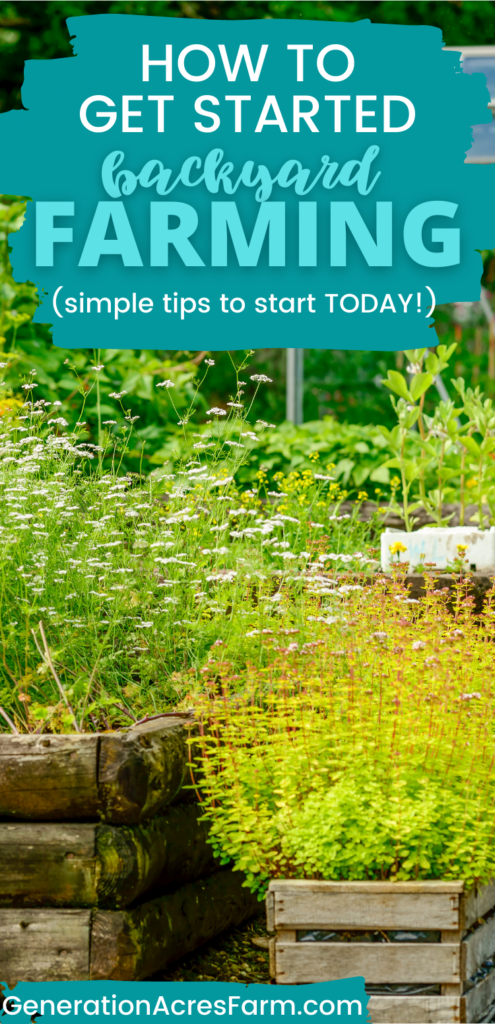
How To Add Edibles Into Your Landscape
Tucking in edible bushes, trees and plants isn’t difficult. You just need to change the way you think about the plants you bring onto your property.
Instead of growing ornamental shrubs and bushes, replace those with edible bushes like blueberries, blackberries or loganberries.
If you are planning to plant the popular ornamental Bradford pear tree, replace it with an edible pear tree. And also add peach, apple and mulberry trees while you are at it.
For plants, you can grow herbs in place of flowers. Herbs like rosemary, lavender, dill and parsley are great ones. Nasturtiums are a great edible flower if you are looking for a lot of color
Fig trees are another great option, they don’t get too big and with age they can provide loads of delicious figs for your family.

Container Gardening
Using containers, there are many things that can be grown on a balcony or patio. Some great options for container gardening are:
- tomatoes
- radishes
- spinach
- sweet peppers
- chili peppers
- kale
- lettuce
- onions
- chard
- herbs
- strawberries
- dwarf fruit trees
That’s just a list to get you started, there are plenty more vegetables that can be grown in pots.
Check out this post on 4 common seed starting mistakes and how to fix them.
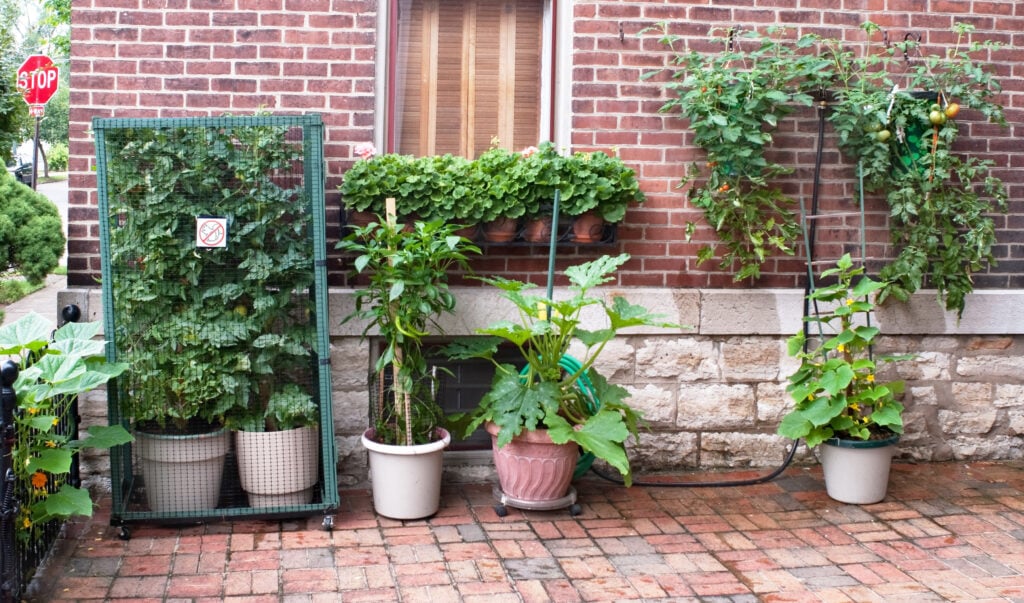
Planting An In Ground Garden
If you have a little bit of yard space, then an in ground garden may work well for you.
To get an in ground garden going, you will first need to remove the sod. There are a few ways you can do this:
- Use a sod cutter
- Dig out the grass by hand
- Solarize it
After the grass is gone or dead, you may want to till the ground to loosen it up. Then you will want to add a lot of organic matter. Such as composted horse/cow manure, composted chicken manure, rabbit manure etc.
After you have added a bunch of organic matter, I suggest you contact your local extension agency to get a soil test. This test will give you insight into what other amendments you may need to add to your soil in order to have a successful garden. We needed to add lime and nitrogen rich blood meal to get our soil levels up to par.
If you want to learn how to start seeds without a greenhouse, check out my post on winter sowing here.
Raised Bed Gardening
If you don’t want to fuss with killing or pulling up grass, raised bed gardening may be a great option for you. There are a lot of positives to gardening in raised beds, such as:
- less weed pressure
- more control of soil nutrients
- raised height can be easier on your back
- they look nice and tidy
Down sides to raised bed gardening:
- initial cost for buying the raised bed garden kit
- time consuming to build, if not using a kit
- initial cost of filling the beds with soil
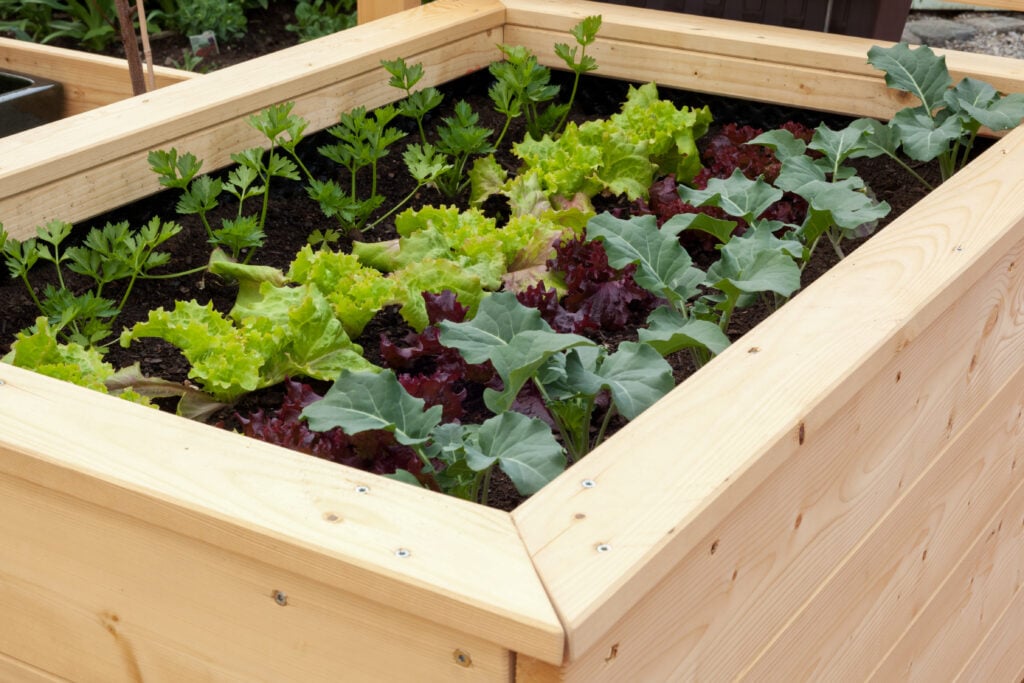
Food Preservation
Now that you are growing all this wonderful food, you need to learn how to preserve it. There is no shortage of books, guides and courses on this matter, so it won’t be difficult to learn this skill.
Common Methods of Food Preservation
- canning
- vacuum packing
- salting
- sugaring
- chilling
- freezing
Backyard farming is a rewarding endeavor and learning how to properly preserve your bounty of fresh fruits and vegetables is a crucial skill.
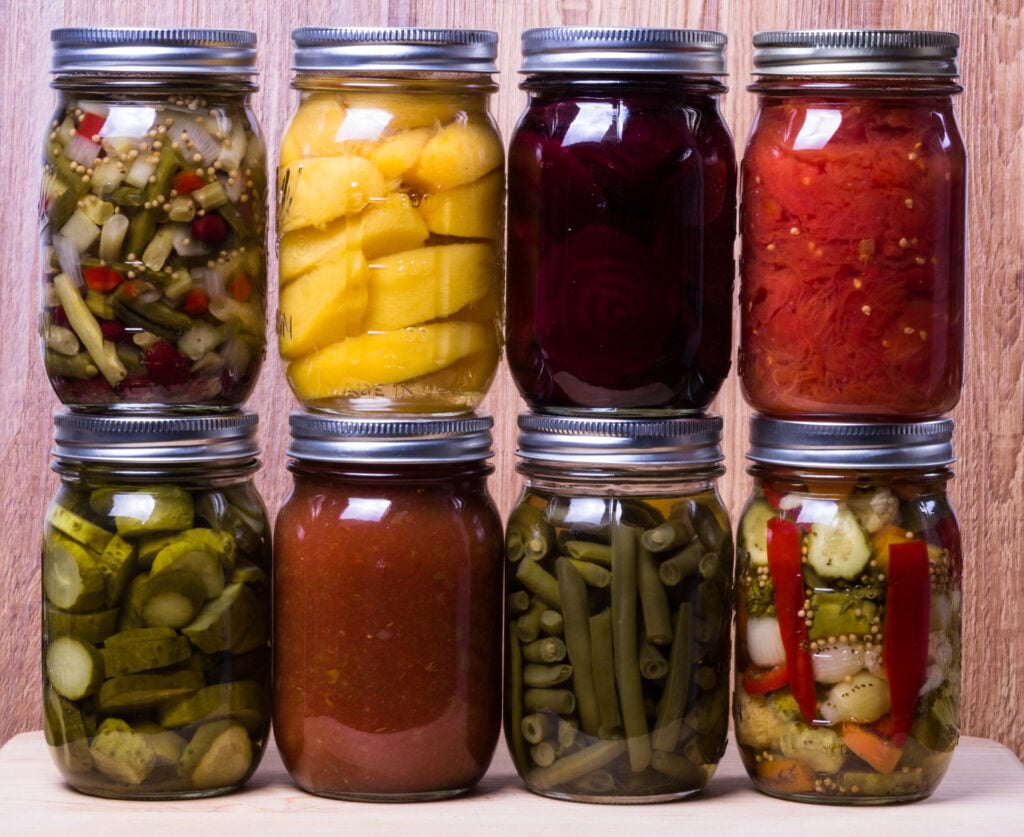
Composting
According to the environment protection agency, more than 28 percent of our country’s waste consists of compostable materials. Composting at home could reduce millions of tons of organic waste from going into landfills, thus reducing greenhouse gases.
What is Composting?
Composting is the natural process of recycling organic matter, such as food scraps and leaves, into a nutrient rich fertilizer that can help enrich soil and plants. When the organic matter is left to decompose, the result is rich, fertile soil that is called compost.
I think it is amazing how the Creator designed organic matter to decompose and become food for the soil, to help grow more food.
How To Get Started Composting On The Backyard Farm
To keep things easy, I like to keep a compost bin, like this one hanging on my cabinet, next to the trash can. This model has a lid and a filter and we haven’t had any smell or bug problems.
We line the compost bin with these biodegradable liners to keep the bucket clean.
When the bucket fills up, we take the bucket to the compost pile in our backyard and dump it.
For the best composting success, you need to use a certain ratio of carbon to nitrogen. The ideal ratio for a backyard farming compost pile is 25 to 30 parts carbon for every 1 part nitrogen.
To explain it simply, greens are nitrogen and browns are carbon. Greens would include things like food scraps, grass clippings and coffee grounds. Browns would be paper, leaves and twigs.
To speed up the decomposition process, you can turn the pile periodically, by using a shovel or pitchfork. Another helpful element is water. Keeping your compost pile moist will speed along the process.
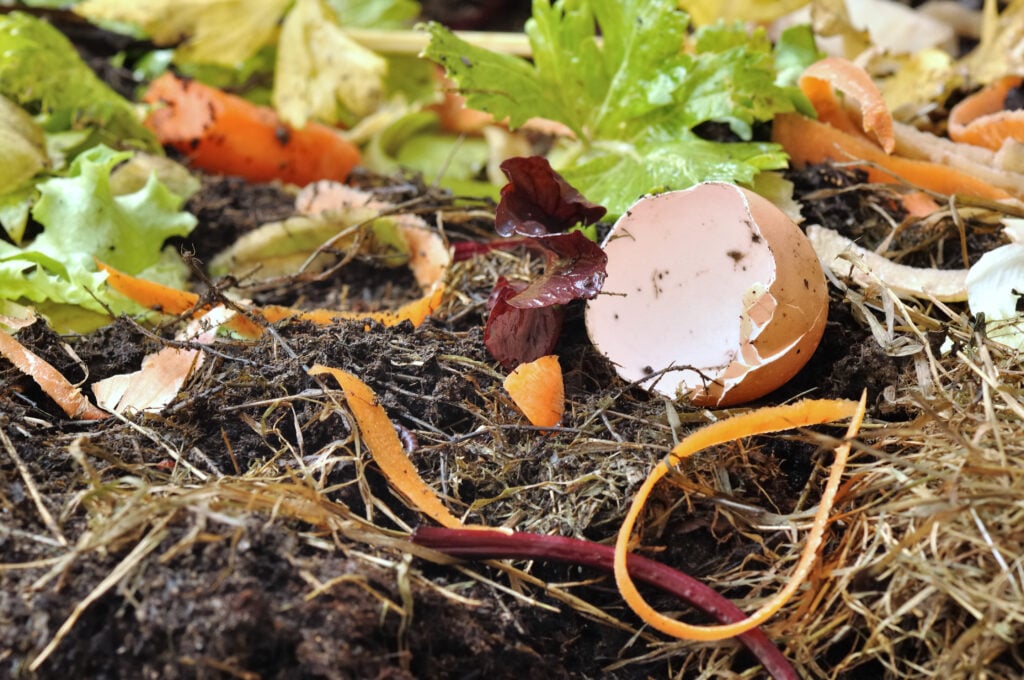
Backyard Farming With Animals
So far we have covered some great backyard farming ideas. We talked about gardening in your backyard or patio with raised garden beds or containers. We talked about the importance of learning how to preserve your harvests and we also discussed composting.
Now let’s dive into the world of backyard farming with animals. There are a number of animals that are extremely useful on a homestead or in a backyard farming scenario, so let’s talk about those.
Chickens For The Backyard Farm
I bet you knew that chickens was going to be my first suggestion, didn’t you? Backyard chickens have become increasingly popular in the last decade and for good reason. Chickens are extremely useful on the homestead for eggs, meat, manure, pest control, scratching out garden weeds and they are just plain fun!
Chickens were my “gateway drug” to backyard farming, as it were. When we were looking for our homestead, I was fine with being in a neighborhood as long as I could have chickens. Every time our realtor sent us a house, my first question was “do they allow chickens?” Most people want to know about the school systems, or the community pool, but not me 😉
Before you go bringing chickens into your backyard, make sure to check with your local laws and make sure they allow backyard chickens.
Some towns allow a certain number of hens and no roosters, others have laws that aren’t so strict, but it’s best to check it out before you bring the fluffy girls home.
Chickens For Eggs
Getting eggs from our backyard farm never gets old. I love carrying the basket out to the chicken coop and collecting those beautiful eggs.
And much like vegetables and fruits, fresh eggs from chickens that you feed in your backyard just taste better. Especially if you allow them to free range and eat all the grass and bugs they want.
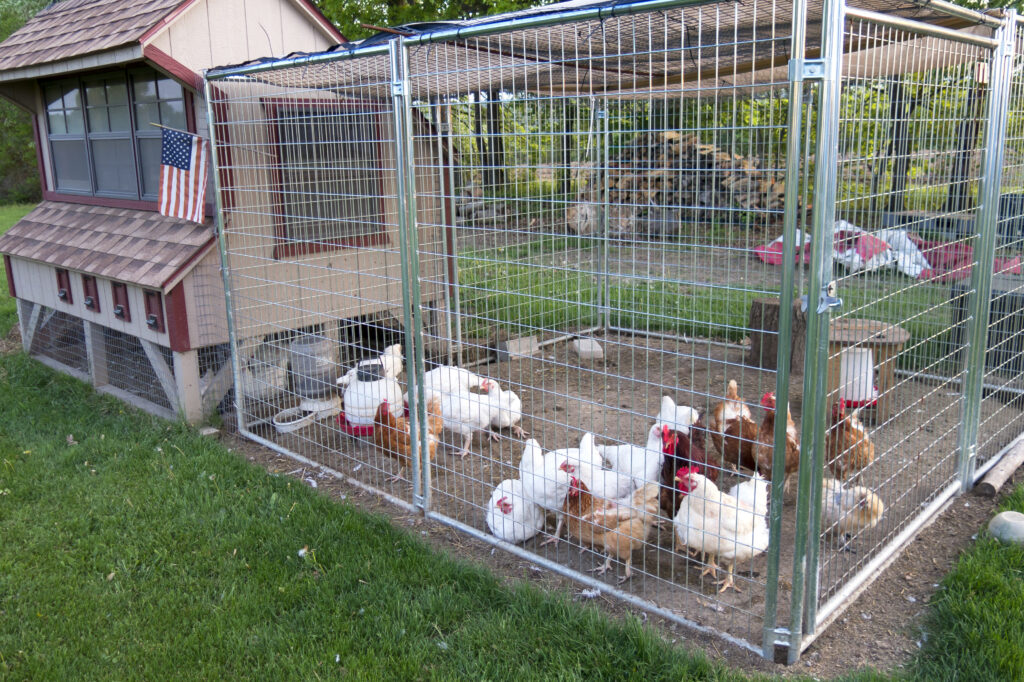
Chickens For Gardens
Chickens can be used in several ways in your garden. My favorite way to use them is to let them scratch out all the weeds and leftover plants when the season is over. They can turn a weed-ridden garden into bare ground in just a few weeks and they leave behind their manure which feeds the soil as it breaks down over time.
Another benefit to having chickens for your gardens, is that they can eat the bad produce. If you have a tomato with a worm in it, the chickens will devour the tomato and the worm will be like the cherry on top for them. Chickens also love bolted lettuce that has gone bitter, they will scratch and eat fallen fruits from the trees which takes care of the smell and a potential fly issue.
Lastly, you can collect the chickens manure and allow it to compost and use it as fertilizer in your gardens when it’s broken down into nutrient rich soil.
Chickens For Meat
And I can’t end my talk on chickens without addressing the benefits of raising chickens for meat. Many backyard farmers order a big batch of meat chickens in the spring and raise them until they are about 8 weeks old. Once they reach the right weight, they can be processed and stored in vacuum sealed bags in the freezer.
Backyard Farming With Rabbits
Rabbits are adorable little animals, but besides being cute, they can serve several purposed on the backyard homestead.
There are several breeds of rabbits that are bred for their fiber. Angora wool is a fantastic wool for spinning and weaving. And it can be sold for a profit which is always nice.
Raising rabbits for meat is another reason to bring rabbits into your backyard farm. Rabbits are a great way to produce your own meat on a small budget.
Lastly, rabbit manure makes amazing fertilizer for the garden! You don’t even have to compost it first, you can just take it straight from the rabbit pen and into the garden. I love that about rabbits!
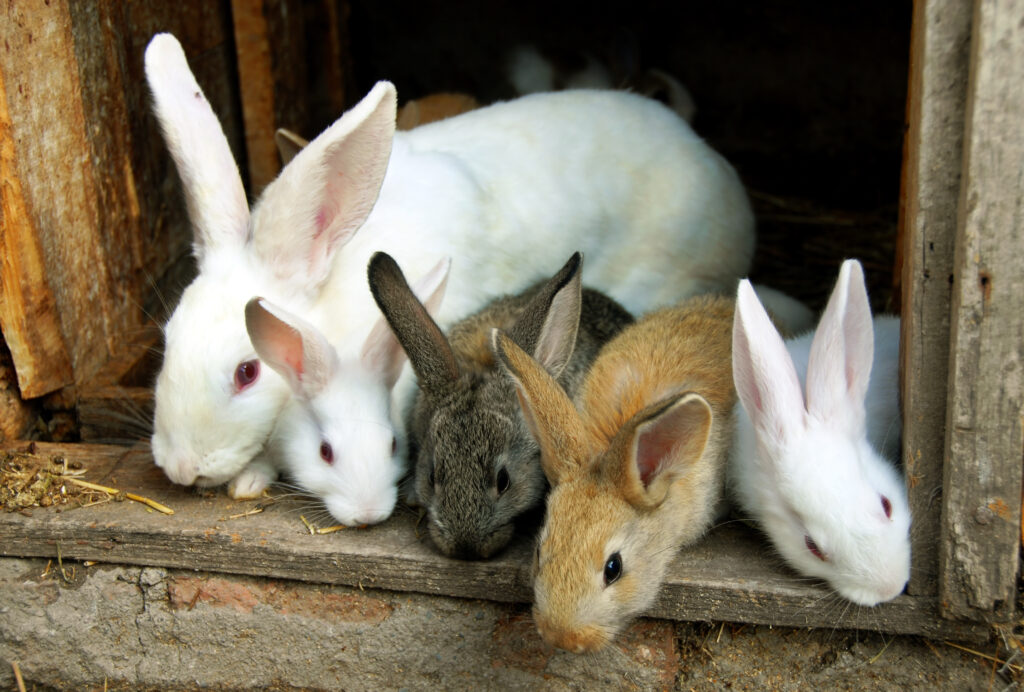
Goats For The Backyard Farm
Many towns across the U.S. are now allowing residents to keep small goats in their backyards for home dairy purposes. Goats are the perfect way to produce dairy on your homestead.
Goats can provide your homestead with milk, meat, they can improve pastures by dropping their manure and they also will “work” for you by clearing brush and small trees.
Goats are a great compact livestock option for smaller backyard farm operations. Goats will provide milk and meat and they require much less space, feed and water than larger livestock like cows.
Another great thing about goats is that their manure is able to be added to the garden as is, just like rabbit droppings.
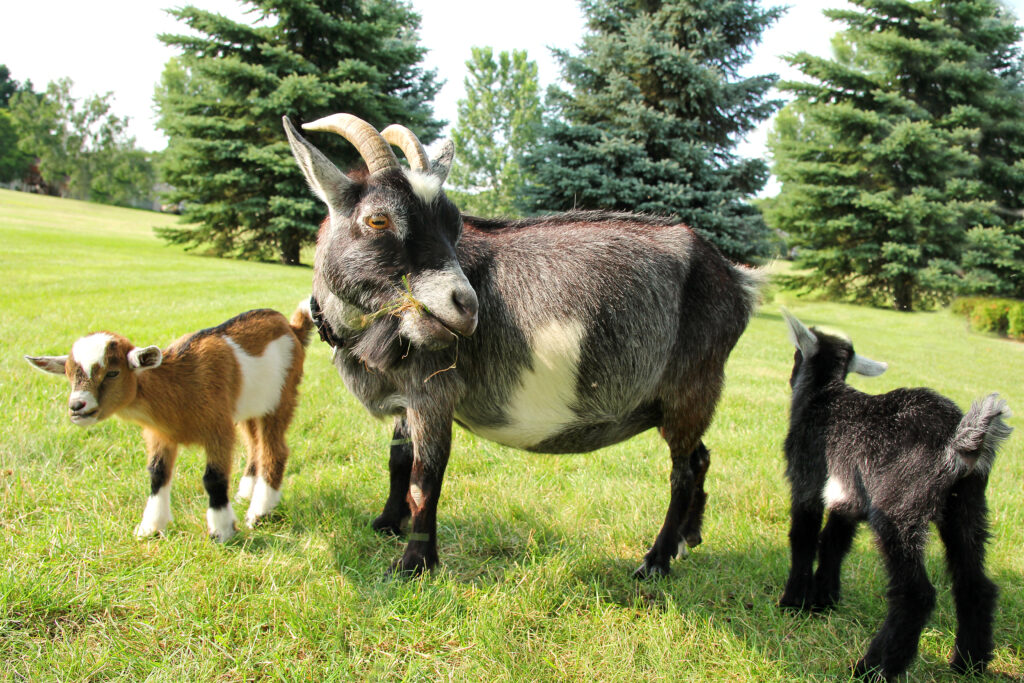
Ducks For The Urban Farm
The last type of animal I want to talk about are ducks. Ducks are a lot of fun for the homestead. But not only do they add splashing fun, they also provide delicious eggs and meat.
You may be thinking, “I can’t have ducks, I don’t have a pond”, but I am here to tell you that most ducks don’t need a full blown pond. A lot of breeds can get by with just a deep container of water for dipping their bills in. And if you want to really spoil them, you can give them a kiddie pool to splash in.
Ducks For Eggs On The Backyard Farm
Ducks are fantastic egg layers. Especially breeds like the muscovie, khaki campbell and blue/black swedish. These are great ducks for backyard farms because they are quiet, too heavy to fly far and lay a ton of eggs. They also grow really quickly and can be butchered for meat as well.
We thoroughly enjoyed having ducks on our small half acre homestead and I look forward to when we can have them again.
Ducks For The Garden
Ducks have a leg up from chickens in the garden because they don’t scratch like chickens do. With chickens, you wouldn’t want them in your garden until you were done harvesting everything, otherwise they would eat the produce and scratch the plants until everything died.
Ducks on the other hand don’t scratch, so they can be allowed in the garden(with well established) and they will gently pick off the pests and insects on your plants for you. They love slugs and worms. They will eat some of the greens too, but they will go for the bugs first.

Backyard Farming For Everyone
As you can see by the length of this post, backyard farming is something I am passionate about. I believe everyone should have the opportunity to grow their own food, raise animals and learn to preserve the food they grow. We have been on this journey for almost 5 years now and have enjoyed every minute of it.
We purchased 35 acres of land in 2020 and will *hopefully* be building our farmhouse on the acreage this year. We are looking forward to moving our backyard farm to a much larger scale over the next couple years. We hope to add larger livestock like cows, more goats, donkeys and the biggest garden we can handle.

